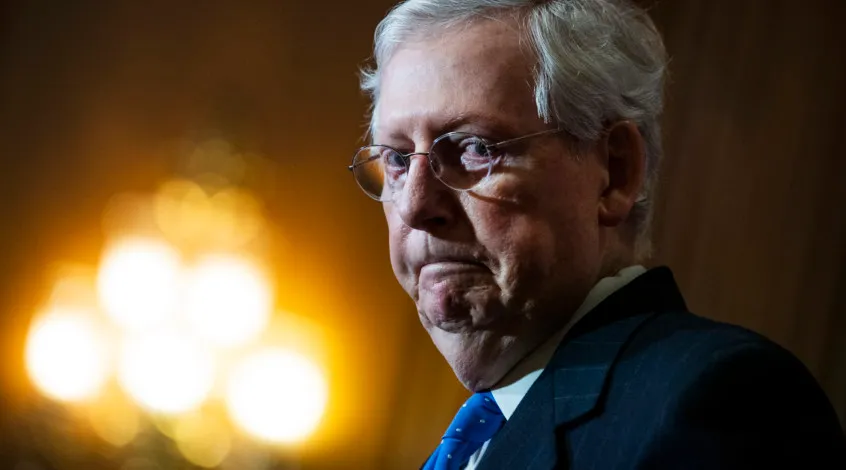Could it be that after 16 years as the Senate Republican boss man Mitch McConnell is losing his fastball?
Time is funny like that. At 81, you wouldn’t expect the Senate Republican leader for seemingly forever to run with the bulls in Pamplona. But there is growing speculation about his physical condition – speculation fueled by the Louisville lawmaker’s custom of keeping any information about maladies, real and imagined, close to the vest, like an experienced poker player in a game of Texas Hold ‘Em.
In the recent past he has been temporarily sidelined by a series of falls and a very odd, not to say disturbing, moment during a press briefing when he stopped in mid-sentence and stared off into space for several seconds before being led away from the podium by fellow GOP lawmakers.
But the question about McConnell’s continued viability as leader involves more than a dissertation on his obvious frailties. None of those listed incidents would necessarily keep him from doing his job. But there are growing signs that McConnell is no longer able to control the caucus as he once did.
McConnell has always used a strong hand in controlling the Senate Republican caucus, consistently able to convince those lawmakers of coalescing behind a precept with little, if any, dissent. It has probably served as his greatest asset as leader.
That chess board ability of lining up lawmakers of sundry backgrounds for a desired outcome is exhibiting signs of wear. The most significant example of this past-his-prime-ism is his inability to corral Sen. Tommy Tuberville (R-AL), a freshman lawmaker and former college football coach (and not a very good one, by the way, as anyone recalling his disastrous tenure at the University of Cincinnati can testify). Tuberville is single-handedly creating pandemonium within the nation’s military for preposterous reasons while McConnell stands on the sidelines and frets.
Tuberville, who is proving critics’ claims that he’s not all that sharp, is blocking the promotions of more than 300 military personnel, including generals and admirals. The Marines, for the first time since 1911, are without a commandant. Gen. David Berger formally relinquished his command in early July and Tuberville is standing in the way of filling that post.
Tuberville is creating the chaos by finagling the Senate’s antiquated, purposeless, and stupid rules. The chamber generally operates on a system of unanimous consent – meaning a single member can delay consideration of appointments or other matters simply by refusing to go along, placing a hold on the process.
While a hold can’t kill a nomination or measure it definitely can gum up the works, slowing matters that otherwise might be accomplished in a relatively short period through unanimous consent. Tuberville’s continued obstruction is delaying routine processes that will now take months to complete.
The method behind the madness is a policy implemented by the Pentagon in wake of the Supreme Court’s Dobbs decision that ended the constitutional right to an abortion. Tuberville is fighting a procedure that simply reimburses military personnel and their families for expenses incurred traveling to a state that allows the procedure for abortion care.
Defense Secretary Lloyd Austin said Tuberville’s actions are impairing the nation’s military readiness.
“Smooth and timely transitions of confirmed leadership are central to the defense of the United States,” Austin said.
In years past, McConnell would have developed a mechanism for dealing with someone like Tuberville, even with Republicans in the minority. Not this time. He has mildly criticized Tuberville’s actions, acknowledging the hold process in this case is “not the best way to go about” dictating a change in military policy. But more recently, McConnell told reporters that he remains “reluctant” to undermine Tuberville’s initiative by supporting a change in the Senate’s outdated hold rule.
“We have holds on both sides,” McConnell said. “What typically happens is you work it out, and I think that’s where we ought to stay.”
The problem, of course, is the “work it out” part isn’t, well, working out after six months of dancing around. If McConnell, as the Senate Republican leader, has an idea on how to “work it out,” he just might want to let somebody else in on it. Problem solving, after all, is his job.
For the time being, it’s not a good look for a Republican Party that traditionally likes to portray itself as more pro-military than thou. Until McConnell finds an escape hatch, the Pentagon will remain stuck in neutral, which can’t thrill the electorate.
The Tuberville incident isn’t the only time McConnell has knocked off a chip on his leadership. Two years ago, he hinted that he was open to impeaching his inter-party nemesis, former President Donald J. Trump, for instigating an effort to basically overthrow the federal government. That changed very quickly when he turned around to see only a veritable handful of his fellow Senate Republicans falling in line.
His quick-as-a-bunny turnabout wasn’t exactly a profile in courage.
Then last year he was challenged, for the first time, in his effort to return as the chamber’s Republican leader. McConnell had been feuding with Sen. Rick Scott (R-FL) for some time about Scott’s calamitous handling of the 2022 elections, which left the party in the minority. Scott sought the leadership job, fell embarrassingly short, but showed that McConnell didn’t maintain the total support of the GOP caucus.
There exist even more substantial questions about McConnell’s ability to lead the pack, given the new realities. Since 2016, with Trump’s election as president, the GOP has undergone a substantial overhaul, transitioning from a tool of the Chamber of Commerce to a right-wing populist hot bed that now essentially rejects the political philosophy that mainstream Republicans, like McConnell, have long held.
Contemporary Republicans are decidedly more isolationist than their party forebears. McConnell, meanwhile, remains an interventionist and a proponent of aid to Ukraine in its war with Russia. While McConnell has traditionally been a free trader, his party has turned protectionist. Institutions like the FBI and the Department of Justice are facing growing criticism from party loyalists while McConnell supports their crime-fighting prerogatives.
What’s more, there is the question of style. While McConnell has been a “big tent” advocate for the Republican Party, the GOP version 2.0 rejects anyone who strays ever so slightly from the new party orthodoxy. Even that old standby Big Business is in the crosshairs, drawing sneers from the likes of Florida Gov. Ron DeSantis, who is challenging Trump and others for the 2024 Republican presidential nomination, for being too “woke,” whatever the hell that means. McConnell, at least to this point, has always sought to let business be business.
McConnell is not, and has rarely been, a popular figure with the Republican rank-and-file, although he has been able to weather that distaste for years with little turbulence. It’s been pointed out in the national press that he was jeered at Fancy Farm this year, which is not the major occurrence some are selling it as. In fact, if you’re McConnell, your real concern is if you’re not jeered at Fancy Farm, because it would mean the audience no longer considers you consequential.
Regardless, the ground is obviously shifting under McConnell’s feet. And, after almost 38 years on the Senate floor, the new reality might be catching up to him.
--30--
Written by Bill Straub, a member of the Kentucky Journalism Hall of Fame. Cross-posted from the Northern Kentucky Tribune.








